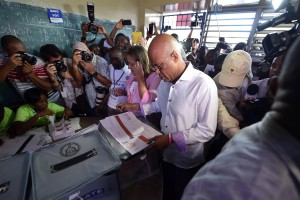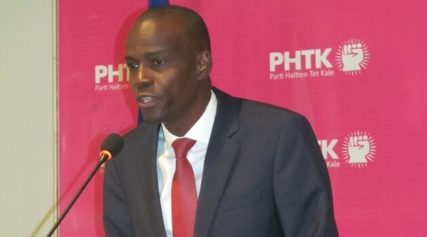
Haitian President Michel Martelly (Photo credit should read HECTOR RETAMAL/AFP/Getty Images) AFP/Getty Images
The runoff of the Haitian presidential election — after the October win for the government-backed candidate — has been cancelled amid unrest in this Black Caribbean nation. This, as the international community calls for compromise between the government and the opposition.
The runoff election — to determine the replacement for outgoing president President Michel Martelly on February 7 — was postponed indefinitely after opposition leader Jude Célestin refused to participate over fraud allegations that resulted in anti-government protests and violence. Célestin called the cancellation “a victory,” according to the Miami Herald, saying the election results were “a ridiculous farce,” and demanding recommendations for an electoral evaluations commission to improve transparency in the runoff election.
Haiti, the poorest country in the Americas, was also the first Black republic in the world and the first in the Western hemisphere to abolish slavery and defeat three superpowers (Britain, France and Spain). Further, since the end of the Duvalier dictatorship in 1986, governance and democracy in Haiti have been compromised by election fraud, military coups and U.S. interference, all of which help to place current events into perspective. And the continued aftermath of the devastating 2010 earthquake has only made things worse.
Presidential candidate Guy Philippe is an ex-police officer who is wanted by the U.S. Drug Enforcement Agency, with a long arrest warrant for alleged cocaine trafficking and money laundering, according to Reuters. The U.S. government has attempted to capture Philippe twice. Further, he is accused by Human Rights Watch of involvement in extrajudicial killings, and in 2004 he led a coup of former soldiers to Port-au-Prince to overthrow the government of President Jean-Bertrand Aristide. Aristide claimed that the U.S. orchestrated that coup to depose him, and that he was told by the Bush administration to leave in order to avoid bloodshed, as CNN reported. Aristide was exiled to South Africa. Further, an exposé of Wikileaks cables by The Nation magazine and the Haitian weekly Haïti Liberté found that high-level U.S. and U.N. officials blocked Aristide’s return to Haiti to prevent him from “gaining more traction with the Haitian population and returning to Haiti,” as Democracy Now! reported.
According to the exposé, the U.S. and its allies spent millions of dollars to slander Aristide as “a drug trafficker, human rights violator, and heretical practitioner of voodoo,” as officials in Washington and at the UN worked with Haiti’s unelected authorities to integrate 400 former army paramilitaries into Haiti’s new police force. In the past, these paramilitaries had attacked Haiti’s democratically elected governments and the country’s impoverished population.
Fast forward to today and the current election woes in Haiti.
“We are ready for war,” Philippe said, according to Reuters. “We will divide the country.”
Philippe remains popular in the southern area of Grande-Anse.
Meanwhile, Martelly, who was barred by law from running for reelection, denies any election fraud. His critics allege vote rigging in favor of his handpicked successor, Jovenel Moise, a banana exporter who in October came in first in the initial round of voting. During the October election, 900,000 observers from all political parties were given special passes to vote outside their home precincts, which, according to human rights groups, allowed the casting of multiple ballots.
“Our generation has a responsibility to show other countries in the world that we are a civilized nation,” Moise said, as ABC News reported. He believes he is the people’s choice as he criticized the decision to call off the election. He also accused the opposition of satisfying their “own personal interests” through the democratic process. On Sunday, Moise supporters used trucks to block a major route connecting to the Dominican Republic. Meanwhile, Martelly supporters took to the streets calling for him to remain in power. Protesters barricaded streets and burned cars in the Haitian capital, as police answered with tear gas and water cannons, according to The New York Times.
Opposition leader Assad Volcy of the Pitit Dessalines platform said that while the election cancellation is a victory, “the demands have now changed. Michel Martelly cannot be part of the solution. He will leave power,” according to the Miami Herald. “It’s not just a battle to change the date of the elections,” he added. “Pitit Dessalines is battling to revise the system that is here. A system that is corrupt, that is punishing, a system that the international community is imposing on the country.”
As required by Haitian law, a new government must take power on February 7. However, election officials say it is impossible to meet that deadline for the selection of a new president, says ABC News, creating uncertainty as to whether an interim government will be set up, or an alternative solution found. The UN and the international community have urged the political factions in Haiti to reach a compromise.
“The Secretary-General … strongly urges all stakeholders to work towards the peaceful completion of the electoral process without delay, through the forging of a consensual solution that will allow the people of Haiti to exercise their right to vote for the election of a new president and the remaining representatives of the new Parliament,” Stéphane Dujarric, spokesman to United Nations Secretary General Ban Ki-moon, said in a statement. In addition, according to The New York Times, the observer missions of the European Union and the Organization of American States also issued similar statements, while condemning “the acts of violence across the country” cited by Provisional Electoral Council President Pierre Louis-Opont as the reason for postponing the vote.
“As in the past, the U.S. is taking great interest in how elections in Haiti are unfolding,” said U.S. State Department deputy Mark Toner, “and expects that persons responsible for organizing, financing or participating in electoral intimidation and violence will be held accountable in accordance with Haitian law.”
According to NBC News, the U.S. has provided more than $30 million to support the Haitian elections.
Meanwhile, the human toll of the 2010 earthquake continues in Haiti. More than 200,000 people were killed, with over 1.5 million people displaced and thousands of buildings and homes decimated.
As Georgianne Nienaber wrote in The Huffington Post, the reported cases of cholera tripled in 2015 compared to 2014, with 19,949 cases and 170 deaths last year, as opposed to 7,739 cases and 56 deaths in 2014. And yet, with $1.8 billion pledged to Haiti by USAID since the earthquake, only 1.6 percent has gone directly to Haitian organizations.
“One must remember that these are cases that made it to reporting centers and hospitals. It is suspected that many more incidents go unrecorded in remote regions,” Nienaber wrote, adding that cholera does not discriminate by age. “Notice the faces from the cholera ward, the Potemkin village built by USAID, the locked gates keeping Haitians out, the pride, the poverty, and the beauty,” she added. “Notice how nothing has changed for those displaced by the 2010 earthquake. Notice the colors, the defiance, the will of the people and the hope in the children’s eyes. We all have much work to do to sort all of this out.”
“One suggestion is that we urge our respective political parties to ask the candidates what they intend to do about the mess we have helped to create in Haiti,” Nienaber said.


